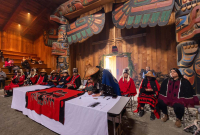Support strong Canadian climate journalism for 2025
Ontario is predicting an unprecedented population boom over the next three decades, particularly in the Greater Golden Horseshoe Area that surrounds Toronto.
The provincial government has given municipalities until July 1 to submit plans to accommodate the influx of people. Some, such as Peel and Durham regions, have opted to expand their urban boundaries, while others like Hamilton and Halton have voted to intensify development within their existing footprints.
Many cities in the area are surrounded by rich agricultural land and opponents of expanding urban boundaries fear irremediable damage to Ontario’s food security, environment and climate.
Canada’s National Observer spoke with Peggy Brekveld, a dairy farmer who is also president of the Ontario Federation of Agriculture, about the pressures farmers — and their land — face.
The interview has been lightly edited for clarity.
What is the current situation with farmland in Ontario?
Between 2011 and 2016, we saw about 175 acres a day taken out of farmland and moved into other categories. Now, it has moved from 175 to 319 acres a day. And that looks like about nine family farms a week — and a whole lot of carrots.
Why is that happening?
A lot of the pressures are coming from development. That could be housing, that could be infrastructure, that could be industrial-type facilities, etc., but it's moving away from farmland and that's unfortunate. We're looking at a continued growth in population in Ontario, and as that happens, you have to feed them somehow. How are we going to feed the people who are coming? Yes, we need housing, but housing can exist while protecting farmland at the same time. We just have to be strategic about how we plan and how we make decisions with a long-term vision in mind.
What are the concerns with the provincial government’s approach to planning and growth?
The biggest concern is that as a city continues to grow out, it tends to take over farmland. Farmland in Ontario is about five per cent of the land base and because that number is low, it's actually a very precious commodity. It looks really easy to develop on an open field, it looks like we can put houses there. But what we really need to do is look at: can we renew and review our current footprint for urban areas? Have we reached our intensity targets inside the city that now we must go wider? Those kinds of questions should be answered before we ever even think about looking at the farmland that feeds the people who live in the city.
What sort of effects is climate change having on farmers and farmland?
Farmers see climate change in their everyday lives. When I was growing up — I live in Thunder Bay — I never saw raccoon, we saw moose commonly near the city. Those moose have moved away and we see raccoons and different wildlife. In a farmer's field, [climate change] looks like the crop diseases that are coming up from southern climates. We see it in wildlife. We see it in weather: violent storms, significant rain events or drought like the northwest had last year. It does impact our farming. We do our best through science and crop varieties, through good management, to try to adapt to climate change. But it affects our crops and makes it more difficult to farm.

Why does it matter? Why is farmland important?
Sometimes people don't realize that cities are often rebuilt right beside farmland. Cities often established where there was food, water and shelter. That was where the best farmland was. And so if we're not careful, we will slowly but surely sprawl over all of the farmland and it will make us less food-secure. I'm not sure where the wheat will come from for your morning toast or bagel. I do know when it does come from Ontario, it is the best quality and I think that that's something worth protecting and preserving.






Comments